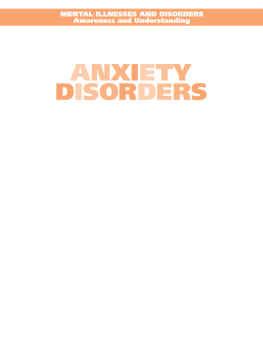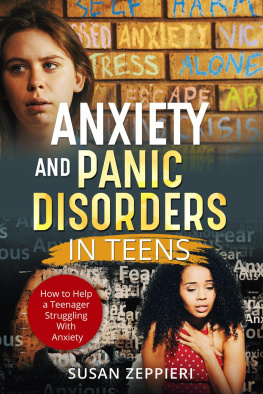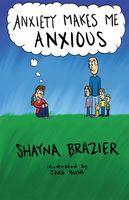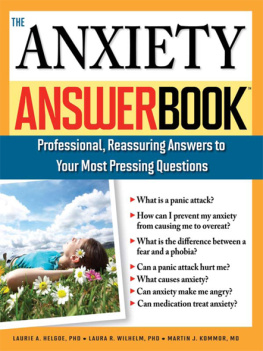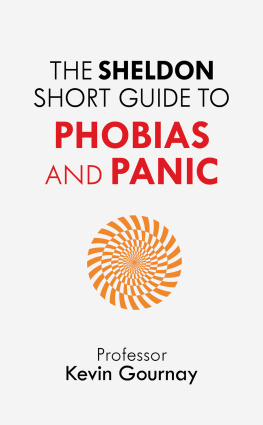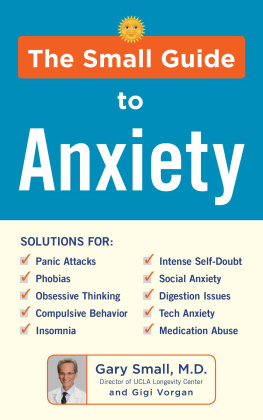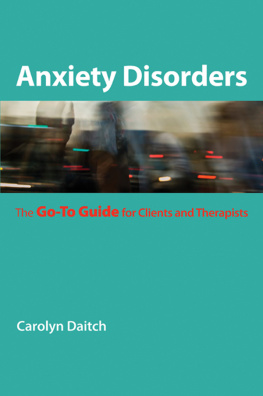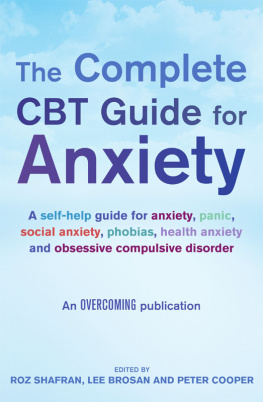Living
WITH
Anxiety
Living
WITH
Anxiety
A CLINICALLY TESTED
STEP-BY-STEP PLAN FOR
DRUG-FREE MANAGEMENT
Dr. Bob Montgomery
and
Dr. Laurel Morris
Many of the designations used by manufacturers and sellers to distinguish their products are claimed as trademarks. Where those designations appear in this book and Da Capo Press was aware of a trademark claim, the designations have been printed in initial capital letters.
Copyright Dr. Bob Montgomery & Dr. Laurel Morris 1992
First published in Australia 1992 by Thomas C. Lothian Pty. Ltd.
North American edition 2001 Fisher Books
All rights reserved. No part of this publication may be reproduced, stored in a retrieval system, or transmitted, in any form or by any means, electronic, mechanical, photocopying, recording, or otherwise, without the prior written permission of the publisher. Printed in the United States of America.
Text design by Tonya Hahn.
Set in 12-point Minion by Perseus Publishing Services.
Cataloging-in-Publication data for this book is available from the Library of Congress.
ISBN-13978-1-55561-306-8
ISBN-101-55561-306-3
eBook ISBN: 9780786731275
Da Capo Press is a member of the Perseus Books Group.
Find us on the World Wide Web at http://www.dacapopress.com
Da Capo Press books are available at special discounts for bulk purchases in the United States by corporations, institutions, and other organizations. For more information, please contact the Special Markets Department at Perseus Books Group, 11 Cambridge Center, Cambridge, MA 02142, or call (617) 252-5298 or (800) 255-1514, or e-mail .
Introduction
This book is mainly for people having problems with anxiety or with an anxiety disorder, such as panic attacks, phobias, posttraumatic stress disorders and obsessive-compulsive problems. Reading the early chapters will help you decide whether you have a problem with anxiety and, if so, what kind of problem.Reading and working through the later chapters will help you tackle your anxiety problem effectively.
Psychologists, counselors and other mental-health professionals who work with people suffering from anxiety problems can use this book as an aid. It provides explanations of those problems, which can help the sufferer feel less dismayed by them, and it sets out step-by-step instructions drawn from current research and clinical practice. It is intended to provide mental-health professionals with a structured program they can adapt to each persons needs, thus facilitating cost-effective therapy or counseling and also helping maintain any gains the person makes in therapy.
This book deals only with anxiety-based problems. Your level of anxiety reflects the level of stress in your life. We will not consider in detail any major sources of stress that contribute to your anxiety, such as a bad job or a troubled marriage. However, we do describe post-traumatic stress disorders in and outline some steps for both preventing and managing them. But, if your anxiety problem is mostly the result of a current or recent crisis experience, we recommend you use our book Surviving: Coping with a Life Crisis.
SELF-HELP OR PROFESSIONAL HELP?
Self-help manuals have a mixed record of success. Some are helpful, some are not and some, particularly pop psychology books on sexual problems, can even make people worse. We have based this book carefully on current research and established clinical practice and we are confident that it will be helpful and not harmful.
However, successful self-help depends on three factors that are under your control:
- You need to correctly identify your problem as one of anxiety rather than something else. The early chapters in this book should help you to do that with some confidence.
- You need to be reasonably sure that you do not have some other significant problem that may be contributing to or complicating your anxiety problem. Again, the early chapters should help you to decide this.
- You should follow our suggestions reasonably closely. We dont mean to be rigid and you can adapt our advice somewhat to suit yourself. However, sometimes people make what they think are small changes to a procedure that in fact make a big difference in how it works. If you have a lot of trouble applying one of our suggestions, it could mean that you have not correctly identified your problem, or that you have not recognized some interfering complication, or that you have not understood the instructions.Whichever of these applies, it may be time to think about getting some professional help.
We have based this book carefully on current research and established clinical practice and we are confident that it will be helpful and not harmful.
The people who do best at self-help are usually those with relatively uncomplicated problems and reasonable self-confidence. They can see themselves being successful at a self-help project. We encourage you to try self-help because it can build your self-confidence to see yourself solving your problem on your ownand its more cost-effective than consulting someone. But if you are not successful at self-help or if, after you have seen what it entails, you think its too much for you, then we encourage you to seek professional help. This is not a sign of weakness. Its common sense.
Weencourage you to tryself-help because it can buildyour self-confidence to seeyourself solving your problem onyour ownand its more cost-effectivethan consultingsomeone.
We suggest you consult a qualified clinical psychologist. In the United States, look for a psychologist who is board certified by the American Board of Clinical Health Psychology, an affiliated board of the American Board of Professional Psychology. In Canada, look for a psychologist who is accredited by the Canadian Psychological Association or who has a postgraduate qualification in clinical psychology. Dont be afraid to ask. A responsible professional will not be offended and you might save yourself a lot of wasted effort and money.
Unfortunately, if you dont have health insurance, or if your insurance doesnt cover (or inadequately covers) mental health, seeing a psychologist can be expensive. If you cannot see a qualified clinical psychologist, then consult some other kind of counselor or therapist. Just remember this rule of thumb: If you dont feel like youre getting much help after a few consultations, with anybody, you probably wont get much help in the long run. We encourage you to exercise your rights as a consumer and find help somewhere else.
WHAT ABOUT MY DRUGS?
Because anxiety problems are common and because most medical practitioners have not learned any other way of helping, many people with anxiety problems are prescribed drugs. We consider the problems and risks of this approach in detail in .We also give you a plan for weaning yourself off unnecessary drugs.
Even if you think the drug is not helping you, you should wait to wean yourself off until you work through . If you have been taking the drug for any length of time, your body will have adapted to it. If you just stop taking it, you risk having a withdrawal reaction, which can be very unpleasant. You dont need an extra problem right now. So lets get to work on your anxiety problem.
1
What Is Anxiety?
- Anxiety is an unpleasant state that includes increased biological arousal, negative feelings, negative thoughts and an inward focus of your attention.


